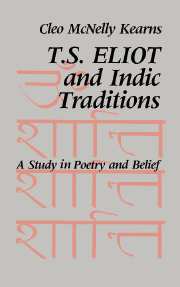4 - Philosophical Issues
Published online by Cambridge University Press: 07 October 2011
Summary
Two years spent in the study of Sanskrit under Charles Lanman and a year in the mazes of Patanjali's metaphysics under the guidance of James Woods, left me in a state of enlightened mystification. A good half of the effort of understanding what the Indian philosophers were after – and their subtleties make most of the great European philosophers look like schoolboys – lay in trying to erase from my mind all the categories and kinds of distinction common to European philosophy from the time of the Greeks.
T. S. EliotWe must recognize a sense in which, while all systems lead us back to the point from which we started, yet as the experience of the trip is what we are out for, the choice of route is all important. In reality our whole view of life is at stake in the finest shred of logic that we chop.
T. S. EliotELIOT UNDERTOOK his readings in Sanskrit and Pali at a time when the study of Eastern texts and traditions was widely regarded as an important adjunct to the study of philosophy in the West. Oriental languages were taught in association with philosophy at Harvard, and many specialists on whose linguistic work and interpretations Eliot relied – James Woods and Paul Deussen, for example – had begun their careers as philosophers and turned to Eastern studies as a natural outgrowth of philosophical concerns. Philosophical terms and problems set the context of Eliot's reception of Eastern thought and informed much of his response to and use of specific texts and ideas, both in his criticism and in his poetry.
- Type
- Chapter
- Information
- T. S. Eliot and Indic TraditionsA Study in Poetry and Belief, pp. 87 - 130Publisher: Cambridge University PressPrint publication year: 1987



